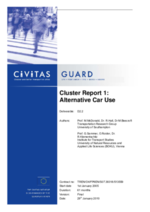Setting up a car-pooling scheme for workers
Summary
The use of private cars by employees travelling to work to the industrial zone of Burgos was causing major congestion problems. As the regular bus service was not able to respond to all employees’ needs, a short- and long-distance car-pooling scheme was developed and promoted with a variety of incentives.
Implementing sustainable mobility
Prior to the implementation of the measure, car pooling was not a common practice in the city. Car use was very common in the city, and on average there were just 1.2 passengers per private vehicle. Car pooling was limited to specific cases of company employees who shared the same route and work schedule, or students at the university with the same timetable. In these cases, vehicle occupancy rates were generally around 50 percent, but never 100 percent.
The CIVITAS CARAVEL measure was based on new technology for sharing information on distances and passenger routes.
The scheme, coordinated by the Municipality of Burgos in cooperation with Instituto Tecnologico de Castilla y Leon, comprised two categories: long and short journeys.
Short-distance car pooling was actively promoted for daily travel to and from industrial zones and the university. The scheme began with an awareness-raising campaign for employees and students; price incentives to offset fuel costs; the development of means to identify high-occupancy vehicles; the installation of touch screens providing information on car pooling and other transport services; and connection to a website designed to facilitate contacts between potential and actual car pool participants. Preferential parking was also allocated in the relevant zones.
Long-distance car pooling was developed for people from the outskirts of Burgos and neighbouring municipalities who travel daily into the city for work. This involved negotiating agreements with local municipalities to promote the scheme and contribute information to the website.
Activities therefore involved:
- the development and upgrading of the computerised system for managing the car-pooling scheme, and in particular for the implementation of dynamic routing;
- the preparation of a study on car pooling in relation to different target groups;
- the development of incentives for vehicle sharing, including financial incentives to offset fuel costs;
- the development of reserved parking areas;
- the organisation of public information campaigns;
- training on the scheme in industrial zones for employees and at universities for students;
- training of council employees in the operation of the on-line system; and
- direct marketing campaigns.
Progress
Information dissemination campaigns were organised at the beginning of the project, as well as periodically to assist in awareness raising among potential users. The website was launched in 2008, and users were able to benefit from discounts in restaurants and gyms.
Results from a similar scheme in Stuttgart were applied, and good communication was maintained with local companies and student bodies.
Outcomes
- By 2009, some 200 people were involved and 45 trips were being carried out per day.
- The marketing campaign achieved good results: more than 50 people decided to join the initiative.
- The initiative was generally well received (97 percent of people had a good opinion of it in 2007; and 100 percent in 2008).








